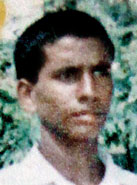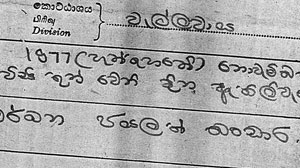This article is published in conjuction with Oct 10th World Anti Death Penalty Day | ||
| Entangled in a murder at 16 plus, prisoner G5610 pleads for Presidential clemency. | ||
| Kumudini Hettiarachchi reports | ||
| Dressed in full white, Jayalath Bandara greets us with palms together in the traditional Sinhala way. It’s just like any meeting across the country, or is it? The harsh reality of this meeting is different. It’s not a convivial gathering of people over cake and hot cups of tea at 11 in the morning. We are meeting Jayalath in the small area leading to D-Ward, having reached Bogambara in Kandy at around 8.30 a.m. Jayalath slumped in a wheelchair has as his backdrop the huge barred and padlocked door of D-Ward with cells behind it.
This 33-year-old has been convicted and sentenced to death for murder, lost his appeal, with the conviction and sentence being upheld. (See timeline of his life’s tragic events.) He has not been hanged, however, as Sri Lanka has placed a moratorium on the implementation of the death penalty, with the last hanging being in 1976. With all the hype about the recruitment of a new Alu Gosuwa (Hangman), by whatever name he is called, which he has read in the newspapers, a chilling fear pervades his very being, though the tingles do not run down his spine, for he has been paralysed waist down since 1996. So what, will ask all the law-abiding people of this country? If Jayalath committed murder, justice has to be meted out. The Sunday Times took an in-depth look not only at the pathetic but also the tragic plight of Jayalath who had allegedly been embroiled in this case as a lad of 16 plus. The tale of unfortunate circumstances unfolds at D-Ward. The day his life changed irrevocably is etched in his memory like yesterday. It was January 2, 1994, the Sunday before the new school term began when Jayalath as a 16-year-old would go into the Ordinary Level class at the Central School in his hometown of Wellawaya in Moneragala district. His family had some land, mainly goda idam but little mada idam (kumburu or paddyfields). There was a dispute between Jayalath’s father and his grandmother about a plot of land. Jayalath’s family, with father and three sons including Jayalath had toiled in this particular kumbura for long and weary hours. However, that fateful Sunday, a neighbour told them that the “chandiya” (thug) in the village was ploughing the land. Api deveni paratath haala thibbe. Niyara kapala, we wapuranna witherai thibbe, says Jayalath, with his eyes brimming over at the events which made his life take a drastic turn. (His family had already ploughed the field and had only to cut the niyara and sow the paddy)
An argument ensued and the deed took place, with father and elder brother immediately giving themselves up at the Police Station. Jayalath’s terrified mother and sisters then packed the young lad off to a relative’s home in Mahiyanganaya, while the police arrested the second brother. On the instigation of a neighbour who had a grudge against them, the police also insisted that Jayalath should be taken in as well. The rest, of course, is tragic history for the family. With no money to hire good lawyers, the home and livelihood in disarray and only womenfolk to fight out the unfamiliar legal battles, the case dragged on without, according to rights activist Bernard Edirisinghe – who along with many others is urging and pleading for Jayalath’s release even so late in the day – the court being told clearly that he was a minor at the time of the incident. While the case was dragging on, fate had more in store for Jayalath. Out on bail, he was up on a kurumba tree with another village lad when he lost his footing and fell, injuring his spine. That effectively confined him to a wheelchair, a fact most probaly court had no indication of. Pavula seeseekada gihilla, says Bernard, with Jayalath’s father, Disapala Mudiyanselage Thillekeratne dying on death row and one brother, Ranasinghe Bandara, being knifed to death while on bail, when he was waylaid and robbed of his wages as a mason’s helper, while returning home. The other brother, Gnanathilake Bandara is on death row at Welikada Prison with whom Jayalath recently had a tearful reunion when he went “visit balanna” there. Jayalath’s distraught mother, Sudu Menike had died after being driven insane over Jayalath’s fate and trying to get him released. His two sisters, both farm labourers, in Wellawaya and Mahiyanganaya, are holding Bodhi pooja for the release of their malli even at this late stage. The ravages of prison-life have not wreaked havoc on Jayalath who has a pleasant and fresh-faced demeanour. Mulu davase kalpana kara kara inne, he tells us explaining that the time is spent thinking. He can’t eat, he can’t sleep. His three cell-mates look after him, carrying him to the toilet for his ablutions, bathing him and wheeling him in his chair. Jayalath appreciates not only the kindness of his death-row peers but also the prison officials. On death row for about eight years, his routine could send many round the bend. Waking up at 6 a.m. they are given their breakfast and let out for half-an-hour just to get some air and sun right outside D-Ward, followed by lunch and then locked up in their small cells between 12 noon and 2 p.m. Thereafter, they are let out into the main area of D-Ward till 5 in the evening and then locked up in their cells after dinner from that time till 6 the next morning. “We can read newspapers and books and watch a little TV or play draughts,” says Jayalath who is one among hundreds of prisoners on death row. There is no rehabilitation for those sentenced to death asthey have to be kept under lock and key. Jayalath keeps pondering his fate, uninterested in what is happening around him for the Sword of Damocles, nay the hangman’s noose swings just over him. His sisters who have to work very hard for their daily rice and curry simply cannot spare the time nor do they have the money to visit him at Bogambara. As we bid adieu to ‘No. G5610’ on death row, the tears flow and Jayalath looks longingly at the door that we move out of and across the garden to the huge gate that shuts this world from the buzz of Kandy town. There is only one hope for what seems a terrible travesty of justice, as the world marks Anti-Death-Penalty Day tomorrow (October 10). The hope for Jayalath is a pardon from none other than President Mahinda Rajapaksa. Timeline of events
|
Wednesday, October 12, 2011
Paralysed and on death row By Kumudini Hettiarachchi Sunday Time 9 Oct 2011
Subscribe to:
Post Comments (Atom)


Hi there, i've made a blogpost about the death penalty, i would be really grateful if you just take a quick look at it! Thank you! :)
ReplyDeletehttp://www.midnightconceiver.com/2011/10/im-against-death-penalty.html